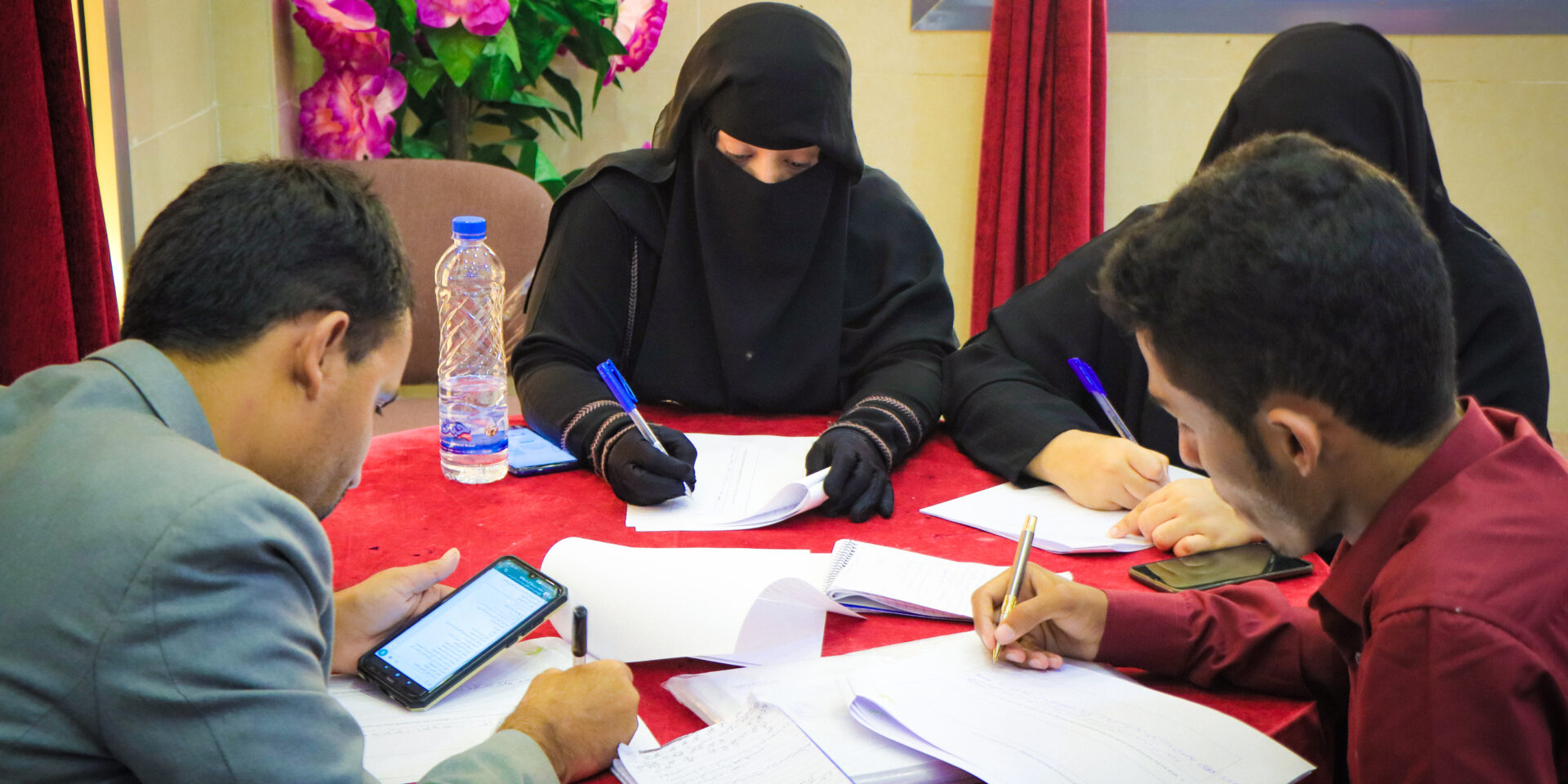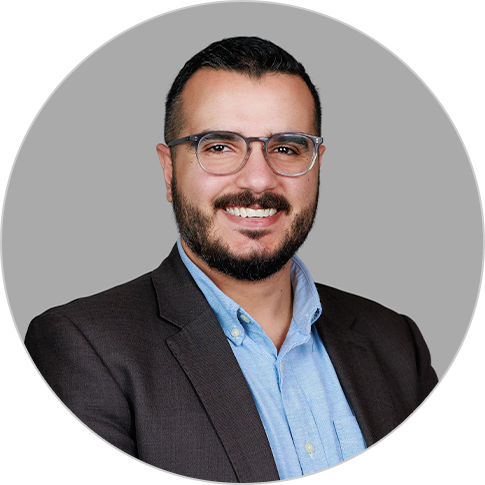
In Conversation with Ahmed Al Khameri: A Career in International Development
December 14, 2022 | 5 Minute ReadThinking about a career in International Development? Our Communications Team sat down with The Yemen Support Fund's Team Leader, Ahmed Al Khameri, who shares his own experiences and advice about working in International Development.
Ahmed Al Khameri is the Team Leader for a programme funded by the UK Government’s Foreign, Commonwealth and Development Office (FCDO) – The Yemen Support Fund. Ahmed came to this role having directed Chemonics International’s UK Yemen portfolio, including the design, start-up and delivery of the Yemen Support Fund and the Yemen Peacebuilding Program – Josoor, a four-year program to resolve local conflict and enhance social cohesion. Ahmed has also served as a Senior Project Manager for the FCDO’s Syria Education Program, Manahel. Prior to joining Chemonics, Ahmed spent seven years serving in governance advisory roles to the UK Government’s Department for International Development (DFID), with an emphasis on Yemen conflict dynamics. Most recently, he was the governance advisor under the DFID Yemen team leading DFID’s stabilization and governance efforts. Ahmed is a Chevening Scholar, holds a Master’s in International Politics from City University London and is a fluent Arabic speaker.
Earlier this year, Ahmed represented Chemonics at the Chemonics-sponsored London Development Symposium annual conference*. Following the event Ahmed was keen to publish this blog to ensure that a wider audience is able to benefit from the practicalities of a career in international development, in addition to the academic and theory-based lessons they can access through their universities or online.
What got me into international development?
You would think that a career in international development begins with a degree in a related subject. But for many of us who grew up in fragile and conflict-affected states, knowing where to begin is not straight-forward when it comes to international development.
I started thinking more seriously about my career options at the age of 18, triggered by curious teachers asking me where I saw myself in five years, in order to help me narrow down my university degree options. At that time all I knew is that I was building up more interest in following the news and wondering about making a change in my community. Growing up in a middle-class family in Yemen, at that age we complained about better areas to play sports, entertainment parks and public spaces, and lack of equal opportunities for overseas scholarships.
Having a Bachelor’s Degree is important but I learnt that for international development, the set of skills you develop is of equivalent importance. Language is significantly important. As an Arab native I was privileged to enrol in English medium schooling and was forced by my mother to take my studies seriously, so she influenced what I listened to, watched, and who I spent my time with. Some colleagues in the sector take a crash course and others teach themselves a new language. Whichever way suits you, learning a second language gives you a strong advantage and is invaluable. It not only allows you to communicate with people speaking that language, but it also equips you with a nuanced understanding of the culture, and grants you access to a wealth of knowledge in international development. These are significantly important skills to have when approaching diplomatic relations and stakeholder engagement within international development.
I also found it beneficial to develop a strong network and analytical mind. This should come naturally to you if you are living in a fragile or conflict affect state, because when the systems and rules that are meant to be in place to protect and serve you are not working, you are more self-dependant, aware of realpolitik and value the importance of building and maintaining relationships. Alternately, developing an interest in understanding trends, systems, and behaviours of individuals, groups and institutions can be strengthened through reading and storytelling. Find something you are interested in, read about it, explain it to an audience of your choice, and don’t forget to express your opinion. Adding to that, having an analytical and problem-solving mindset makes you stand out as someone who knows how actions are incentivised, what drives peoples’ interests and fears, and understands how they relate to the bigger picture.
The language and analytical skills and the people I networked with through my interests are what ultimately got me my first job in international development – as an assistant in the Political and Economic Team at the US Embassy in Yemen. From there I was able to draw a roadmap into becoming an expert in international development, working for world class development agencies, the UK Government’s DFID, and now at FCDO partner, Chemonics International.
What does the world of international development look like?
International development is a collective effort to make a change towards a better and more prosperous future and to resolve some of the many challenges the world is facing, such as issues related to climate. Allied to this, international development can also provide benefits for the donor country, by addressing issues that have a key bearing upon domestic challenges. At the very top there are strategic political activities that are driven by an individual state’s sovereign national security objectives. These, at times, feed into collective regional or international mutual benefits. Key donor countries shape the world of international development. This is because of the size of their contributions, their influence over the implementation infrastructure, and their ability to demonstrate thought-leadership.
Where does one begin to enter the world of international development?
Twelve years into my career, I can tell you that there are different routes into international development, and where you start and end depends on your objective and the journey you wish to take. What is important for your journey is that you remember that experience takes you a long way in international development. A combination of a unique set of skills, from directing a policy to managing a budget, will help you stand out. A combination of field work and policy experience will help you see the big picture, be strategic and more likely to withstand shifting mandates and priorities.
Governments can present multiple career opportunities in international development, but there are limited opportunities or growth prospect if you are not a citizen member of that government. At the implementation level, there are multiple channels that can be broadly divided into multilateral organisations, namely the World Bank, International Monetary Fund, International Finance Corporation, and the United Nations’ agencies. There are also regional and country-level organisations, and of course also local community-level organisations. These organisations fall into both the for- and non-profit sectors, and their areas of expertise can vary geographically or thematically.
What is a working day like in international development?
This will vary depending on your role and the organisation you work for. One day could be about reaching a policy position that translates your organisation’s/government’s stance on supporting education. Another day could be about budgeting and finance as you re-calibrate your programme, and another day could be about logistical planning as you arrange a high-level visit to one of your project sites. One thing that is almost guaranteed in international development – every day is a different day.
I find that when one works with a team spirit, when one is kind and shows empathy, then their journey in international development becomes ever more meaningful.
* The London Development Symposium 2022 was an event organised by students from the International Development Societies of the University of London – the London School of Economics (LSE) and the School of Oriental and African Studies (SOAS).
Banner image caption: Participants in a training course on the involvement of youth and women in reducing conflicts and building peace, in September 2021 in Yemen. The photo was taken by a Team Member of the Josoor Peacebuilding Programme.
Posts on the blog represent the views of the authors and do not necessarily represent the views of Chemonics.

